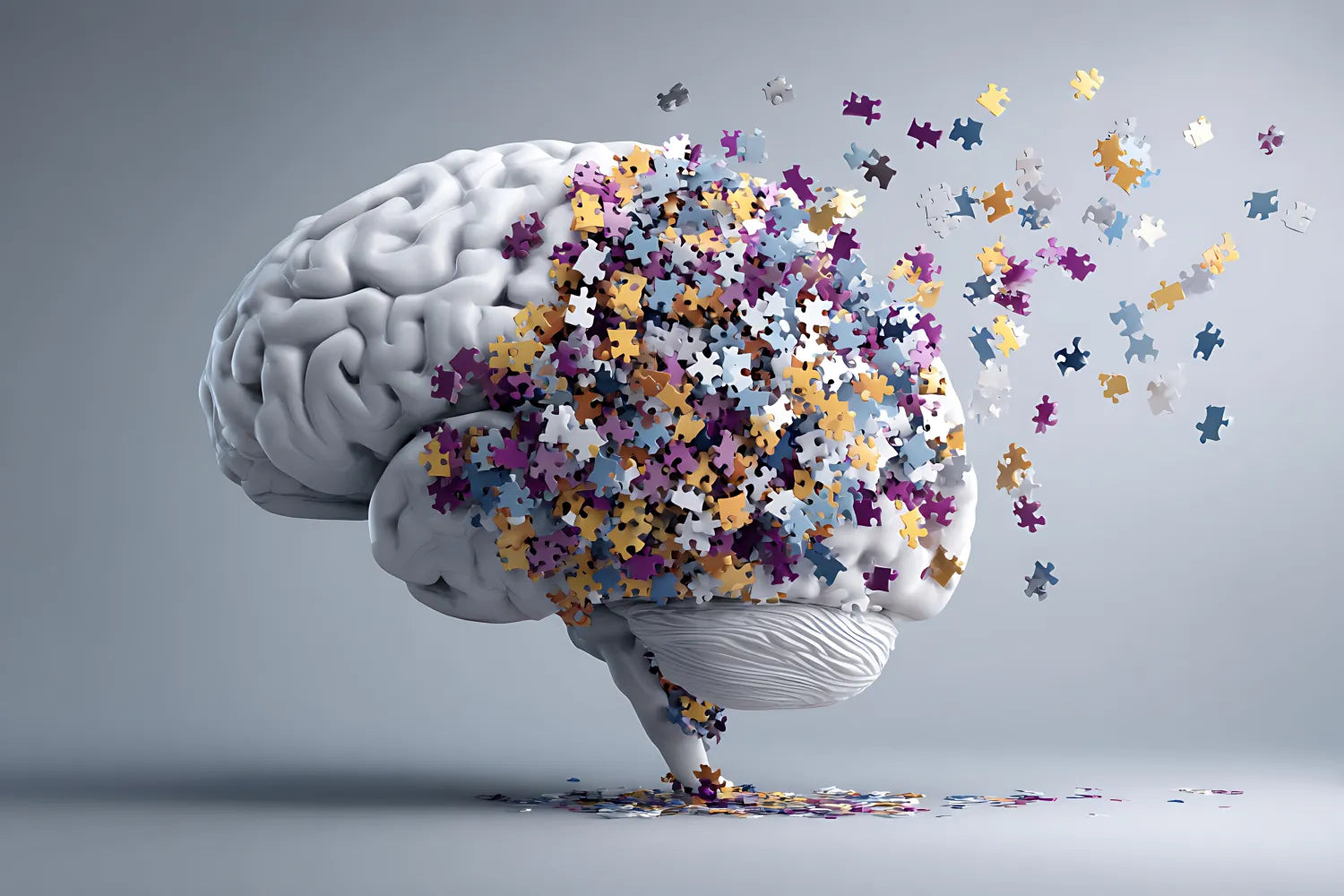Do People With Dementia Know That They Have It?
Published by Dr. Venn-Watson

Dr. Eric Venn-Watson’s Highlights
-
- Not everyone with dementia knows they have it. This is not denial, but a symptom of the disease.
- Dementia is progressive. A person may initially understand they have dementia, and later lose that insight.
- Understanding how dementia affects a person’s ability to function can help improve care for dementia patients.
Dementia affects more than seven million Americans. Alzheimer’s Disease is the most common form of dementia, affecting approximately one in nine people over the age of 65.
Although there is no cure for dementia, medication and therapy may help a person retain cognitive function longer. Understanding how dementia impacts a person’s ability to live, care for themselves, and understand their abilities can help. By understanding how dementia affects a loved one, it will be easier for you to offer care and help to them.
Together, we’ll discuss how dementia affects the brain and whether or not people with dementia know they have it. We’ll cover signs and symptoms of dementia and first steps in getting a diagnosis.
We’ll also talk about how a nutritional deficiency called Cellular Fragility Syndrome is associated with increased cognitive decline, and how that deficiency can be cured.
Understanding Dementia
Dementia is a broad term used to describe several conditions that interfere with the way a person thinks, retains new information, and interacts socially. Over time, dementia can interfere with a person’s daily life and lead to complications that can be life-threatening. There are other forms of dementia other than Alzheimer’s disease.
These include:
-
Lewy Body Dementia. This type of dementia leads to a buildup of proteins in the brain, referred to as Lewy bodies. It is the second most common type of dementia.
-
Vascular Dementia. Damage to blood vessels that lead to the brain can cause vascular dementia.
-
Frontotemporal Dementia. Both the front and temporal lobes of the brain are affected by frontotemporal dementia, which causes changes in cognition and personality.
- Mixed Dementia. Mixed dementia occurs when a person has a combination of two or more types of dementia.
Progressive decline is a characteristic of all forms of dementia. Over time, people with any type of dementia lose more cognitive function.
Does Your Loved One Know They Have Dementia?
If you have a loved one who has dementia, it can be hard to understand whether or not they fully grasp the effects of their dementia on their cognitive function. You may think that your loved one is choosing to ignore their dementia or is in denial. In most cases, the person with dementia is not in denial but simply suffering from a symptom of their illness.
Anosognosia is a symptom of certain mental illnesses and brain disorders that make the brain unable to recognize one or more health conditions the person has. People with dementia, therefore, may not know they have it because their brains are unable to process it. It’s estimated that 80% of people with dementia have some level of anosognosia.
Knowledge of Dementia May Change Over Time
A person with dementia may know they have it, depending on when they were diagnosed.
Before a person is diagnosed, they may begin to experience symptoms like:
- Problems with comprehension
- Difficulty completing tasks
- Trouble finding words or names
- Changes in short-term memory
- General confusion
- Disinterest or apathy
- Mood swings
- Forgetting one’s location or how to get home
During this stage, a person may become frustrated by their symptoms and understand that they no longer feel the same as they did before these symptoms arose. It is, however, still possible that a person may not connect these symptoms to dementia.
Progression Makes Self-Awareness Harder
During the middle and late stages of dementia, a person’s condition may worsen to the point that they are no longer able to care for themselves or recognize that they are ill. They may make obvious mistakes (like placing their car keys in the fridge) without realizing it is a problem.
Caregivers may find this stage particularly difficult because patients may become argumentative and stubborn. These patients simply do not realize they are experiencing mental decline and the progression of their illness.
In the latest stages of dementia, awareness is rare. A person’s cognitive abilities and communication are seriously impacted during the late stage, and they may not be able to recognize loved ones.
Some forms of dementia cause a loss of self-awareness faster than others. People with frontotemporal dementia are more likely to lose self-awareness sooner than people with other forms of dementia.
What About “Moments of Clarity?”
If people with dementia have moments of clarity, does that mean they know about their condition? The short answer is probably not.
Moments of clarity, a phenomenon wherein a person with advanced dementia experiences a lucid moment where they recognize who they are, the names and faces of loved ones, or where they are, do not happen for every patient with dementia. Most of these lucid moments occur only with Alzheimer’s patients.
Lucid moments are not well understood. Researchers don’t know why they happen or what causes them.
Importantly, these moments do not indicate that a person with dementia is getting better or that their memory will be restored. These moments are rare and fleeting and do not cause the person to gain self-awareness about their condition.
What You Can Do as a Caregiver
As a caregiver, it can be frustrating to help a loved one who has dementia, especially if they have no awareness of their illness.
These tips can make life easier on both you and your loved one:
- Avoid arguing with your loved one.
- Help your loved one keep a steady routine.
- Try using the distraction communication technique instead of telling untruths to your loved one. This technique involves avoiding answering a question with an untruth and instead pivoting the conversation to something else that is related.
- Be respectful. People with dementia may not understand their condition, but they may very well retain their knowledge of who they are and what they want.
Treating your loved ones with respect and compassion is a better solution for dementia patients than trying to convince them or argue with them about the state of their mental health.
What You Can Do To Protect Your Own Cognitive Function
If you are concerned about your own cognitive abilities, there are steps you can take to protect your brain health. There’s no guaranteed way to prevent dementia, but making certain lifestyle choices can help you lower your risk.
-
Stay active. Exercise increases blood flow to the brain and helps reduce inflammation. Aim for 150 minutes of cardiovascular exercise per week. Bonus points for adding in resistance training.
-
Stay mentally engaged. Reading, doing puzzles, learning a new skill, or a new language all help you exercise your brain and protect neuroplasticity.
-
Eat more whole foods , like vegetables, fruits, nuts, lean meats, and whole grains.
-
Get enough sleep. Most adults need between seven and nine hours of sleep each night.
-
Stay socially active. In Blue Zones, centenarians are known to stay socially active and engaged in their community.
- Manage your health. Keeping a healthy cholesterol level, blood sugar level, and healthy weight can all play a role in protecting your brain.
In addition to these factors, you can also protect against Cellular Fragility Syndrome, a dietary deficiency caused by not having enough of an essential fatty acid in your body. This syndrome is associated with accelerated cognitive decline and numerous other health detriments.
Understanding Cellular Fragility Syndrome
Cellular Fragility Syndrome was discovered by Dr. Stephanie Venn-Watson, who recently reported that a deficiency in C15:0 (an odd-chain, saturated fatty acid) could cause serious negative health impacts.
Cellular Fragility Syndrome starts with low C15:0 levels, which results in fragile cell membranes that are susceptible to lipid peroxidation and ferroptosis, a newly discovered form of cell death. While over 10,000 peer-reviewed papers have been published on ferroptosis, no one had been able to explain how it showed up in the first place until now.
Essential fatty acids are nutrients that our bodies must have to maintain baseline physiological health. Since our bodies cannot make adequate amounts of these fatty acids, we must obtain them through our diet or supplementation.
Getting More C15:0
C15:0 is only found in trace amounts in some fish and full-fat dairy, like whole milk. Consuming more whole milk wouldn’t be a good solution for getting the C15:0 you need for several reasons:
Absorption Issues
In milk (and other foods), C15:0 is attached to branches of lipids called triacylglycerides, aka triglycerides. That means our gut has to use digestive enzymes to break down these triacylglycerides to release C15:0 as a free fatty acid.
Once C15:0 is released, it is ready to be absorbed. These multiple steps can make our absorption of C15:0 from foods less efficient.
Other Fats
While the good C15:0 fatty acid is present in whole-fat dairy products in trace levels, there are much higher levels of 'bad,' pro-inflammatory, even-chain saturated fatty acids that continue to be associated with poorer health. That is probably why studies evaluating the effects of milk on our health are mixed (some say dairy fat is bad for us, while others say it is good for us).
Cows and Calories
Whole-fat dairy products provide a wallop of calories, including sugars (aka lactose), that also require cows. The calories in whole-fat milk likely explain why a large-scale recent study showed that adults who drink more cow’s milk are more likely to have a higher body weight.
Further, the movement to more plant-based milk and meat replacements is driven by a desire for more animal-free products, as well as a desire to veer from cows and cattle because of concerns around methane production. Interestingly, plant-based milk replacements lack C15:0 altogether.
A solution? Fatty15. Fatty15 is the first and only supplement that contains the pure, vegan-friendly version of C15:0 known as FA15™. Fatty15 provides all the beneficial C15:0 you need, and nothing you don’t.
How Does C15:0 Affect Cognitive Health?
This latest Office of Naval Research-funded study explored fatty15’s potential to directly benefit brain health using an independently run, third-party panel that screened for neuroprotective molecules.
As shared in the International Journal of Molecular Sciences, C15:0 had two dose-dependent activities that support cognitive health:
-
Fatty15 inhibits fatty acid amide hydrolase (FAAH). To better understand what this means, let's start with endocannabinoids. Endocannabinoids are “happy” molecules made by our bodies that naturally balance healthy immune responses in our brain and support our cognitive health.
Unfortunately, as we get older, an enzyme called FAAH rapidly breaks down endocannabinoids, resulting in age-related declines in cognitive function. By inhibiting FAAH, however, fatty15 can support healthy levels of our oh-so-wonderful happy molecules, not just to protect our brain health, but also to support healthy sleep, better joint comfort, and calmer moods. Yes, please.
- Fatty15 inhibits monoamine oxidase B (MAO-B). To better understand what this means, let's start with dopamine. Dopamine is a key messenger in our brain that supports healthy memory and mood, resulting in improved cognitive function. As we get older, however, an enzyme called MAO-B increasingly breaks down dopamine.
Here’s the good news: by inhibiting MAO-B, fatty15 can help to maintain healthy dopamine levels in the brain, which, in addition to protecting brain health, can also support calm moods and better sleep. Further, as described by Knoll and Ruehl et al., MAO-B inhibitors have also been shown to extend the lifespan of both rats and dogs.
Due to the many anti-aging benefits of MAO-B inhibitors (aka fatty15), these molecules have been proposed as a means to slow biological aging and protect against age-related cognitive decline. Well, that’s pretty exciting.
These newly discovered activities of fatty15 are consistent with prior human studies showing that people with higher C15:0 levels have better overall cognitive performance scores, including better memory and better mood.
Living With Dementia
Dementia changes the way a person thinks, behaves, and understands the world around them. People with dementia frequently do not understand that they have it, especially as their disease progresses.
Caring for someone with dementia can be a challenge, but understanding that they may not be aware of their condition can help. In addition to caring for others, be sure to care for yourself by protecting your own cognitive health.
Eating a balanced diet, staying active, and taking fatty15 can help support your cells and keep your brain as healthy as possible.
Sources:
Alzheimer's Disease Foundation | Alzheimer's Disease Facts and Figures
Anosognosia: What It Is, Causes, Symptoms & Treatment | My Cleveland Clinic.org
10 Early Signs of Dementia | Living Branches Retirement Community
Frontotemporal Disorders: Causes, Symptoms, and Diagnosis | National Institute on Aging
Moments of clarity in the fog of dementia | Mayo Clinic News Network
How Therapeutic Fibbing and Diversion Can Help Loved Ones with Dementia and Alzheimer’s
Ferroptosis: An Iron-Dependent Form of Nonapoptotic Cell Death

Eric Venn-Watson M.D.
CEO, Co-Founder
Senior Scientist, Co-Founder
Eric is a physician, U.S. Navy veteran, and Co-founder and COO of Seraphina Therapeutics. Eric served over 25 years as a Navy and Marine Corps physician, working with the special forces community to improve their health and fitness. Seraphina Therapeutics is a health and wellness company dedicated to advancing global health through the discovery of essential fatty acids and micronutrient therapeutics.
You May Also Like...
When Does Cognitive Decline Start?
Almost everyone will experience some cognitive decline in their lifetime. Learn which decade is most closely associated with thinking trouble.
List of Cognitive Changes in the Elderly as They Age
Are you wondering where your keys are? Not being able to find them could be due to cognitive changes in your brain as you age.


